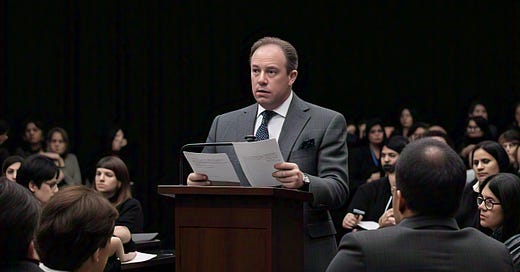The Craft of Conferencing Newsletter
Issue No. 6. News, insights & ideas on public speaking and the business and craft of B2B conference production from journalist, podcaster, and B2B event producer Charles Laughlin. November 25, 2024.
We post here periodically (newsletter and podcast) sharing news, insights, opinions, and best practices on The Craft of Conferencing.
Being good at conferencing is a game-changer for careers and brands. If you organize, speak, sell, or even if you just attend events regularly, this Substack is for you.
The beauty of conferencing is that every skill that falls under its umbrella can be cultivated. Organizing, curating, ideating, writing, speaking, networking, interviewing, selling. Anyone can learn to do any of these things. Yet few of us are great at any of these on day one.
You get out of conferencing what you put into it.
Please consider the content we share here as a key input in your conferencing journey.
The Craft of Conferencing
Are Paid Speakers Worth the Money?
I recently returned from moderating the Asian Local Search and Media Association’s SMBCon 24 conference in Thailand. It was great fun. And it was a very successful event.
After I participate in running any event, I always reflect on what makes a conference successful.
One takeaway that I always have is controversial to some and plain as day to others.
I firmly believe events are better when speakers are there because they want to be there and not because they are paid to be there.
In fairness, this describes essentially every event I am involved with these days. However, I have had ample experience with paid speakers in the past. And it generally wasn’t good.
Of course, there are many great professional speakers out there. And if an event has a big enough budget and its organizers firmly believe that a top motivational speaker or a retired diplomat charging six figures plus first-class accommodation is the right choice for their event, then by all means, do that event.
I am probably not the right person to run that event for you.
Persistently Disappointing
In my experience, paid speakers are disappointing.
Here are a few examples of what I have experienced working with and around highly paid speakers. Your experiences may be very different.
I am leaving out the names of those involved in these examples to protect the guilty and the gullible.
Nice Work if You Can Get It
Several election cycles ago, I was peripherally involved in an event that hired a then very hot political celebrity (a former U.S. presidential candidate among his other claims to fame) as its keynote speaker. I will acknowledge that the name did generate a lot of buzz and it probably filled some seats. I don’t believe any effort was ever made to measure the ROI.
I was not directly involved in booking this speaker, but I did learn that his fee was in the high five figures (USD), plus a first-class plane ticket and five-star hotel accommodation.
I am not sure if the organizers had to remove all of the brown M&Ms from the snack table in the speaker waiting room, but it wouldn’t have surprised me if something similar were in this politician’s contract. BTW, if you get the M&Ms reference, you’ve outed yourself as a Van Halen fan.
The politician did not even give a proper talk. He just engaged in a canned Q&A with the conference chairman. I hate scripted Q&As. They are almost always boring.
In this case, the entire affair felt insulting to the audience. The Q&A lasted perhaps 15 minutes. Nice work if you can get it. There are still speakers pulling off scams like this. I just think it used to be easier.
Expensive and Lackluster
My worst experience with paid speakers came when I organized a corporate retreat for a client company. The retreat was designed so the leadership of the client company and some of its key partners could spend time together dining, golfing, and listening to speakers talk about how technological changes will impact their businesses in the near, mid, and longer term.
We brought in several professional speakers to address this small group of very smart business leaders. This is admittedly a much tougher gig than what the former presidential candidate was asked to do.
Small rooms are hard. You have to look the audience in the eye. And the questions can be tough.
Each of the professionals we hired had credentials as tech thought leaders and speaking fees that reflected their status.
Yet not a single one of them did more than the most perfunctory preparation.
Who am I talking to?
What do they care about?
I do not recall being asked these questions before the event. We still proactively briefed the speakers on these points. But there was little evidence that they listened.
They just came in, gave their canned talks, answered a few half-heated questions half-heartedly, and then left.
Everyone seemed to enjoy the dinners and the golf outing.
I took most of the heat for this expensive and lackluster program. And I deserved all of it. I was lucky I wasn’t fired. And my relationships with the leaders of the client company never recovered.
That experience taught me a great lesson that I have internalized to this day.
People are better performers when they are in front of an audience they want to reach.
They tend to underperform when their only reason to be on stage is a big paycheck and a room at the Four Seasons.
So what’s the takeaway?
My plainly parochial view is that it is better to invest in a good events team than in professional speakers.
A good team of moderators/organizers provides far more leverage.
A good team can produce an agenda, recruit, curate, and prepare volunteer speakers (the ones who want to be there), and manage the total event experience. This includes venue selection, organizing the conference social/networking events, and managing what happens on stage.
Often, when most of an event’s limited budget is devoted to paid speakers, the tasks of managing the event fall to volunteers who are either unwilling or unable (often both) to manage the event in a professional manner. The results in this scenario often are not pretty (see my first example of the 15 minute, five-figure Q&A).
If your event is big enough, perhaps you can and even should invest in both speakers and organizers.
In this scenario, the professional organizers need to possess the experience and judgement to choose the right professional speakers and ensure the event gets its money’s worth.
ICYMI: The Craft of Conferencing Podcast
Episode 4 of The Craft of Conferencing Podcast features event tech founder Ari Driessen of RSVPify. Ari walks through his startup journey, from building an invitation app for his wedding to becoming a turnkey B2B events solution.
Episode 3 of The Craft of Conferencing Podcast features veteran CRO George Leith on how to use conferences for business development and sales. George shares his playbook for successfully using B2B events as a sales channel.
Episode 2 of The Craft of Conferencing Podcast features an interview with the man who wrote the book on crafting great events. Phil Mershon leads the annual Social Media Marketing World event and is the author of Unforgettable: The Art & Science of Creating Memorable Experiences. Phil shares his formula for great events.
The inaugural episode of The Craft of Conferencing Podcast features an interview with event-tech founder Daphne Earp Hoppenot, who recently sold The Vendry to Groupize. The conversation covers the state of B2B events, The Vendry’s eventful ride from launch to exit, and much more.
More great episodes coming soon!
To discuss newsletter and podcast sponsorships and collaborations, write to us at Charles@craftofconferencing.com.
Founding Member-level subscribers to this newsletter receive 10 newsletter or podcast ads. We will reach out to you to get started once you have subscribed at this level.
Learn more by visiting our website.










